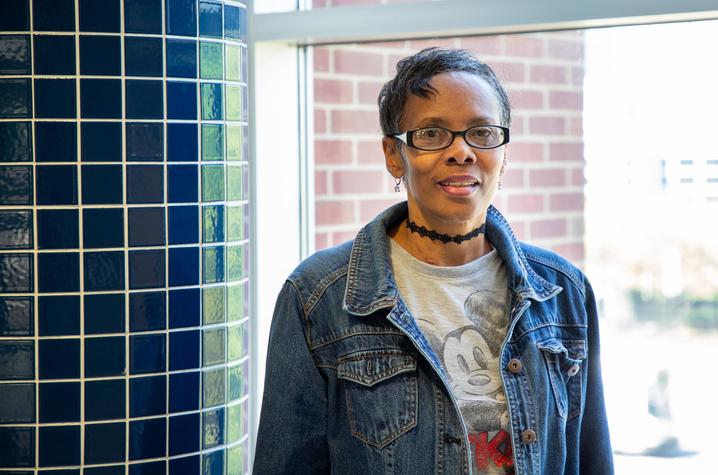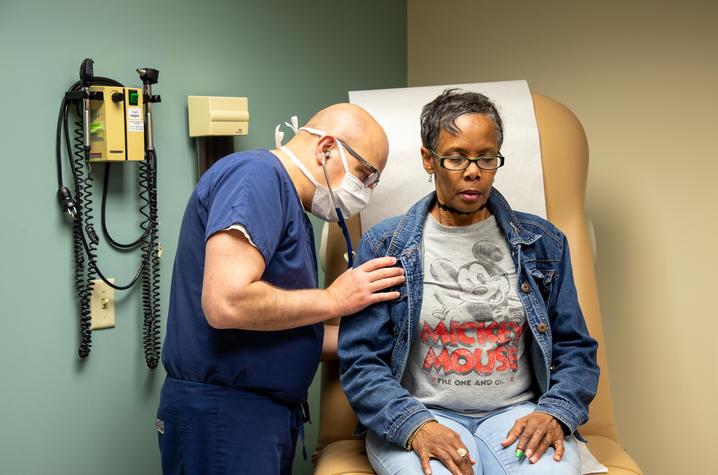Complex heart surgery gives UK patient a fresh start
LEXINGTON, Ky. (Aug. 3, 2023) — Kathy Warren didn’t want to admit she didn’t feel well.
The Danville native had already had her share of health issues. Years of substance misuse took a toll on her heart. She had open-heart surgery in 2012 to replace an infected heart valve. Even though she is in recovery and is no longer using drugs, Kathy was told at the time that she would eventually need to have another surgery. But it was just easier not to think about it.
“I knew that I was going to have another open-heart surgery, but I was just hoping and praying I wouldn’t,” said Kathy. “My feet stayed swollen, and I was really tired all the time. I could hardly walk a block or up a flight of stairs without being tired.”
Kathy’s mother noticed the symptoms and insisted that Kathy go to the emergency department at the University of Kentucky Albert B. Chandler Hospital. When she was admitted for surgery right away, Kathy finally admitted to herself that something serious was happening.
“I was really trying to ignore the signs and symptoms,” said Kathy. “But when they told me they wanted me in the hospital right then and there, I knew I was due for another heart surgery.”
According to her surgeon Hassan Reda, M.D., with the UK Gill Heart & Vascular Institute, this wasn’t something that could be put off or rescheduled. The aortic valve that had been replaced 10 years before was dangerously narrow to the point where the blood flow from the heart to the rest of the body was severely reduced – a condition called aortic valve stenosis. Ejection fraction, the amount of blood that is pumped from the heart with each heartbeat, is measured as a percentage. In a healthy heart, that percentage is around 60%. Kathy’s measured less than 20%. Repeated episodes of heart failure led to a severe reduction of her cardiac function.
That wasn’t Kathy’s only problem. Her prior heart surgery and other health conditions meant that any surgery was going to be very risky.
“We looked at other options, such as putting a valve within the tightened prosthetic aortic valve to help restore flow and improve her ejection fraction,” said Reda. “But that wasn’t safe for her. Her options were to either not do anything and send her to palliative care, or to try a very high-risk procedure.”
The procedure in question is called a Bentall procedure. Reda and his team would recreate her aortic root using a valve from an animal inside a tube graft made from a material called Hemashield. Additionally, the tricuspid valve inside Kathy’s heart – the valve that sits between the right atrium and right ventricle – was leaking and would have to be repaired. The surgery would be long and difficult, but after Reda laid it all out, Kathy was ready to get started.
“It was exciting,” Kathy said. “Dr. Reda had a whole team and I never had that before. He explained what was going on and what they were going to do.”
In September 2022, Kathy underwent the 13-hour procedure. Even though this procedure is a common one for the experienced cardiac surgeons at UK HealthCare, Reda was concerned about Kathy’s chances of making a full recovery.
“We do this procedure often at UK because of a large population of people who have endocarditis,” said Reda. “But Kathy’s was unusual for us because not only did she require a second aortic valve and root replacement, but she also had severe depression of her left ventricular function.”
Even more uncommon, Kathy was put on extracorporeal membrane oxygenation (ECMO) after the surgery because her heart was too weak to manage on its own. ECMO is a mechanical support that pumps blood while the heart muscle rests and heals.
“It’s not very common that we put people on ECMO after heart surgery, but when we do, it’s because they are very sick,” said Reda. “In her case, we planned it from the get-go because we weren’t sure whether her heart would be able to carry her through immediately and would need time to recover.”
After a few days, Kathy was taken off ECMO and continued to get stronger. She spent a month in the hospital, engaging in regular cardiac and physical rehabilitation. Instead of going to a nearby rehabilitation hospital after discharge to continue her recovery, she went home.
At her first post-surgery appointment, Kathy had an echocardiogram to measure her ejection fraction. The result was not what Reda expected.
“To our surprise, her follow up echo showed that her heart made a complete recovery,” Reda said. “I expected her function to get better to 20% or 30%, but to go back to completely normal? She was at 65%.”
***
These days, Kathy is feeling pretty good. Every six months, she follows up with Reda for an echocardiogram. She no longer relies on a walker and can take longer and more frequent walks. She’s looking forward to traveling more and visiting family and California. She credits her success and recovery to God and Reda, her sons Brandon and Chad and the rest of her family for being a great support. Reda looks at Kathy as what can happen when a patient’s determination is matched with compassionate care and medical innovation.
“Some people are beyond our ability to help,” said Reda. “But even with Kathy’s slim chance of success, we took a chance on her. She just wanted to get better. And we wanted to explore every option to help her get better.”
UK HealthCare is the hospitals and clinics of the University of Kentucky. But it is so much more. It is more than 10,000 dedicated health care professionals committed to providing advanced subspecialty care for the most critically injured and ill patients from the Commonwealth and beyond. It also is the home of the state’s only National Cancer Institute (NCI)-designated Comprehensive Cancer Center, a Level IV Neonatal Intensive Care Unit that cares for the tiniest and sickest newborns and the region’s only Level 1 trauma center.
As an academic research institution, we are continuously pursuing the next generation of cures, treatments, protocols and policies. Our discoveries have the potential to change what’s medically possible within our lifetimes. Our educators and thought leaders are transforming the health care landscape as our six health professions colleges teach the next generation of doctors, nurses, pharmacists and other health care professionals, spreading the highest standards of care. UK HealthCare is the power of advanced medicine committed to creating a healthier Kentucky, now and for generations to come.






